- Home
- Barry Unsworth
The Partnership
The Partnership Read online
THE PARTNERSHIP
BARRY UNSWORTH
W. W. Norton & Company
New York ♦ London
For Valerie
1
Foley directed the thin jet of sealing fluid over the pixies at point-blank range, aiming the spray carefully and with growing viciousness at their grinning identical faces, as though instead of merely closing up their pores he intended to disfigure them for life. He experienced this futile hatred for each new batch, as he neared the end; a rage at their numbers, their sameness, the mechanical accuracy of their reproduction. Tray after tray of them came up to him from his tireless partner Moss below until he sometimes felt an urge, not however so far obeyed, to befoul their plaster composure in some way, by spitting on them usually, though grosser defilements had occurred to him. He had not confided these impulses to Moss and did not intend to, not because of shame, in fact he was rather proud of this dark, elemental side to his nature; he was reticent in the matter because he had come to believe that the less Moss knew about him the better, generally speaking.
It was the last tray he was on, anyhow; this dozen completed the two gross and made up the order. Two hundred and eighty-eight lucky pixies, each sitting grinning on the rim of a mottoed ashtray. All they needed now was the paint; three colours would do the lot as long as they were bright enough. The faces were most difficult: you had to have people to paint them who would follow the intention of the moulding and not attempt to mitigate the hideousness of the features. Usually only an experienced painter of pixies had the necessary self-control. It was, though, essential that the face should retain that leer that holiday-makers demanded, the authentic lucky pixie-look of slightly lecherous domestic complicity that was considered to augur well for the year to come.
The spray kept up a faint but steady hiss. The liquid itself was too finely dispersed to be visible – the pixies’ faces were not discernibly moistened by it – but its force, playing over the bench on which the pixies were set, caused flakes of plaster and small particles of gold-leaf to sidle about the room, briefly and with apparent circumspection. It was still April and quite cold outside, though the room itself was close because Foley had put on his electric fire when he started work that morning. Warm currents, weighted by the acrid exhalations of the spray, rose slowly, misting over the closed window.
Foley’s eyes were stinging a little from the fumes and as soon as he had finished the spraying he went over to the window and opened it, remaining there for some moments to look out across sloping sheep-fields to shrub-green cliffs and the pewter-coloured sea beyond. He had felt of late some spleen against the sea, against the whole view in fact, for its refusal to be more dramatic. When, three years before, they had moved into this house and set about converting it for the pixie business he had been excited by the sea view, coming as he did from a basement flat in Battersea. He had secured this room for his own to work in, relegating Moss and his ovens to the dark room on the ground floor. Moss had, of course, been more amenable then, more open to suggestion in every way. Foley had congratulated himself at the time on his shrewdness and tact. Now he was not so sure. At any rate he had failed to live up to the landscape, beginning quite early to miss the minutiae, the changing scenes of life, to which years of living in London had accustomed him. It was true that nothing sordid or petty here distracted the eye; the trees scattered between the house and cliffs were undeniably impressive, especially in the drained or pallid light of certain days when, outlined against the sky, they had an arresting hallucinatory grace, due to the stunting effect of the sea winds which in the course of many winter offensives had combed their branches back against the natural bent, tortured them really, but invariably into the semblance of order, into beauty, like the delicate, impossible trees on Japanese ceramics.
For all this Foley envied Moss his lowlier view of the farmyard and a segment of lane. Indeed he tended now to hold the whole thing against his partner, as though that former tractability had been the result of cunning foresight on Moss’s part. Moss could see hens from his window and hikers or campers occasionally; he could see Royle the farmer, their landlord, going to and fro about his business; he could watch Phyllis the farm girl feeding the hens and observe, if he felt so inclined, the progress of the strong black hairs on her legs. It was not much, perhaps, but compared with what he had himself, a feast of life and colour. He never saw signs of human life from his window at all, unless you could count the intimations of ships on the horizon. Thirty miles to the south, miles of tangled headlands webbed by rocky inaccessible bays, was the capital town; and in the other direction, only two miles away but completely hidden by the curve of the coast, was Lanruan, whose shops supplied them with groceries and took a good part of their pixie out-put.
Relieved at having come to the end of this particular lot, Foley allowed his distaste for the pixies to soften into the feeling of superior discrimination which he had cultivated in order not to feel circumscribed by the work he did. Turning from the window he regarded the pixies steadily for some moments. Moss and he were assisting in an outrage against the whole human race, he thought, with some pleasure at being able to include Moss. These creatures were, after all, made in the human image, though fashions, he conceded, changed in pixies as in all else. They had begun with an idealised, pre-Raphaelite type, wistful of feature and attenuated of frame, but this had slowly coarsened into the present more truly native product, less elegant, lewder, with cunning hints of deformity, and some elements of the comic postcard superimposed, particularly in the bottled vacuousness of the expression.
He was tempted to descend on Moss and ask him straight out whether in his opinion three years of making plaster souvenirs for summer visitors was not bound to affect the health of the psyche, stopping up, for example, certain essential sympathetic responses; or, putting it another way, whether he and Moss could go on immersing themselves in the acid of seasons without being corroded in the end. He had a habit while working of devising such questions, sometimes in elaborately metaphorical form, for Moss, phrasing and re-phrasing them with great care so that they might be perfectly clear and comprehensive and allow no scope for evasion on Moss’s part. But by the time they had reached this chiselled perfection there no longer seemed any point in putting them, they had lost the quality of interrogation. In any case he was quite aware that Moss’s casuistry was a fiction of his own devising, his partner in fact being an unsubtle pedestrian person who would regard such issues with solemn indulgence and no play of mind whatever.
This time the temptation passed almost before the question had been framed, certainly before it had been polished. It sufficed to summon Moss to mind as he would doubtless be at this moment, in his room below, prising out further pixies from the moulds, constantly patting things with his big dusty hands, patting the warm pixies, patting the tops of the ovens to gauge the heat, breathing heavily. Before such an image all query quietly died. Besides, Moss was always wounded by slighting references to the pixies, and it would be a bad mistake, he felt, to bring up just now any subject that might lead to disagreement. There was still some strain between them, a certain wariness, since their quarrel of three days ago, when Moss had upbraided him for staying out late, a mistake this, because although Foley was a malleable person he would always fly into anger when forced into a corner and his dignity threatened. The quarrel had been momentous in that it was the first to mar their three years’ association, the first time, at least, that recriminations had been explicit. Though it was he himself, Foley reflected rather uneasily, who had done most of the recriminating; Moss had simply gone quiet and hurt. And it was he who had subsequently retreated, becoming even more secretive than before. Moss had simply remained himself, if possible more intensely so.
Moss had been difficult lately. It was as though the spring had contained some ingredient indigestible to him, an irritant, an intestinal grit that darkened his outlook, souring his former solicitude into a sort of domineering fussiness.
Neither of them had since made any healing reference to the quarrel, either humorous or apologetic, which might have made it public and manageable, part of the folklore, so to speak, of their association. The whole incident, Foley felt, would have to be left alone now. But it was certainly not a time for needless irritations; it was a time, quite clearly, for tact.
Dismissing Moss’s sensibilities from his mind for the time being, Foley began to pack the pixies into a number of large cardboard boxes. This he did with great care, covering the bottoms of the boxes and each layer of pixies with a thick pad of packing straw, making sure that no two pixies were touching, since breakages were expensive. He enjoyed packing. It was an activity exactly suited to his cautious, treasuring, pattern-forming nature. He liked packing anything: even the loathed pixies took on a preciousness with their fragility as he bedded them in the straw. This morning, however, he was not able to enjoy the process for itself alone, since it brought him up against a problem which until then he had been deliberately avoiding. It concerned the choice of a painter for the pixies.
Later on, when they were really busy, they would use all available painters, but at this time of the year they had a sort of rota system, which seemed fairer. It was the turn of Albert Smart, who lived by digging graves and doing odd jobs. There was nothing against Albert, a lanky respectful man, good with his hands. Moreover he was more or less constantly in need, since deaths were not so very frequent in such a sparsely populated district and he had a number of small children to support. Look at it how he would, Foley could not deny that all considerations of justice and humanity were on Albert’s side. But if he ignored these claims and took the pixies into Lanruan instead, and gave them to someone there to paint, he could call on Gwendoline, not only today but on Friday too, when he went in to collect them, and Moss would be hoodwinked because it was a blameless business trip.
Albert’s sad claims faded as Foley nestled one after the other of the pixies down into the yielding but springy straw. Something in this, something intimate and exploratory and at the same time systematic, gave added force to his desire to see Gwendoline. He might sit on the floor, on her red carpet, watching her move about, that big-boned yet graceful and curiously docile body of hers. It was this doe-like softness he sensed in her, together with her narrow-eyed, sleepy expression, which had attracted him first. He was quite sure she was still a virgin, despite her aspect of fecundity.
Planning seductions was an occupation extremely agreeable to him. He engaged in it frequently, even when through a dearth of suitable acquaintance he was obliged to imagine his heroines. Like packing, it made a strong appeal to the scheming orderliness of his character and it also gave him a long-drawn-out illusion of mastery. He had, however, never succeeded in seducing anyone, if seduction is an unremitting manipulation of another personality. He had some of the qualities: he was good-looking, ready of speech, sensual enough and not given to pity – more capable indeed than many of ignoring inconvenient appeals to chivalry. In spite of these natural advantages something always went wrong, something in himself. He invariably succumbed to the response he aroused, lost his impetus. He could not help posing himself and waiting in a flame of self-love for the over-stimulated moth to immolate herself on his candle. Sometimes this happened, sometimes it did not, but it was never clear in the end who was seducing whom, and Foley found this, however enjoyable at the time, retrospectively lacked the true qualities of a campaign.
With Gwendoline at least he felt he had made a good start. On his previous visit, in parting, he had rested his hand for a moment in the small of her back, in that hollow formed by the spine and the first convexities of the buttocks. He had felt the grain of her silk blouse slide under his palm against the softer, more resilient, flesh beneath. Today he would wait for some accidental proximity, and kiss her. If she rebuffed him he could put it, with an air sufficiently respectful, down to passion. This would do him no harm. No woman could fail to enjoy being the provoker of ungovernable impulses, provided they turned out to be governable. If, on the other hand, which he felt on the whole more likely, she acquiesced, the kiss could become habitual, and a prelude to better things.
Foley finished the packing in a voluptuous heat. Carrying the boxes down to the rear door, ready for loading into the car, the harsher aspects of life again obtruded. Moss now would have to be encountered. Not being kept informed of what was going on was one of the things his partner had lately shown himself to resent. Pausing only to assemble his features into an expression of duty shouldered, he went into the casting-room.
As he had visualised, Moss was bending over the big work-bench in the middle of the room, extracting baked pixies from their lemon-coloured rubber moulds. He had his back to the door and did not hear Foley come in. Footsteps were inaudible in this room because of the thick deposit of plaster dust and shavings which covered the floor. From some source not immediately traceable Moss’s wireless was emitting gusty orchestral music.
‘I have to go down to the wretched village again,’ said Foley. Moss turned the moment he began speaking, and straightened himself. He was a big man, a full head taller than Foley. The front of him, his jersey and denim trousers, were white with fine grains of plaster, and a floury dust adhered to his cheeks and eyebrows and the ridge of his nose, giving him a farcical doomed appearance. Beneath this mask Foley saw two distinct expressions pass over his face one after the other: a sort of automatic solicitude, evoked by the tone of the words, and then, almost immediately, as their meaning came home to him, a wary blankness.
‘What a bore for you, Ronald,’ he said in his customary deep and rather resonant voice, luxuriant with the vowels of his native Essex.
Foley stood silent for a moment, seeking uneasily for inflections of irony in the remark. ‘Yes, isn’t it?’ he said. ‘But we must keep things going, you know, Michael, we must keep our end up.’ A sort of subdued heartiness based on cliché was his habitual conversational stance with Moss whenever, as now, he was conscious of practising a deception. ‘Spread the good word,’ he added, scanning Moss’s face. It was amazing, he thought, how that face suggested gullibility, a willingness to be favourably impressed. It was largely a matter of those round, blue, believing eyes and the unusually high arch of the brows above them, but the mouth too added to this impression by its fullness, its appearance of innocent greed. Only if one disregarded the credulous mouth and eyes and dwelt on the largeness and bluntness of the head, the heavy, prominent bones of temple and jaw, might it have been surmised that Moss was an extremely obstinate and inflexible person. Particularly so in the matter of human appraisals. His acquaintance was not extensive, but they all had a sense of being netted in his opinion of them and they usually suffered in his presence, fluttering into insincerities as they tried to express themselves without coming into conflict with his almost invariably inadequate conception of their characters. Foley, on the other hand, being preoccupied with himself, found it easier to approach people tentatively. Indeed he kept an open mind for so long that in the end he often lacked the interest or energy to close it.
‘You seem to go down there often these days,’ said Moss, again without any apparent intention of irony. ‘Is it really necessary for you to go today?’
‘Well, yes it is, as a matter of fact. It’s the ashtray pixies, you know, the lot we’ve just finished. The people want them for this Friday. Why I don’t know, there’s nobody about yet, but there you are. It’s important we should be on time with them because this is the first order.’ He was conscious of having been too explanatory.
Of course I know all that,’ Moss said. ‘It’s that woman who wears wooden beads that knock against one another, and the man is bald.’ He had resumed work on the pixies. Foley watched for some time in silence,
impressed as always by the tenderness with which he handled them. His thick blunt fingers released them from the clasp of the rubber with an amazing gentleness, a continuously renewed care, as though he were delivering them from the cramping womb. They were all mutants on emerging: these moulds were old now, their edges worn and blunted, and this caused accidental and sometimes monstrous accretions, little ridges and humps, swellings, goitres, phalluses. Sometimes the pixies came out like drowned things, seaweeded or encrusted with dredge. All this had to be put right by Moss, who had a small file for the purpose.
‘Whose turn is it for the painting, someone in the village?’ he asked without looking up.
‘I thought I’d take them to Graham,’ Foley said.
‘Is it Graham’s turn again already?’
‘Well, yes it is, as a matter of fact.’ A furtive anger was beginning to rise in Foley at the other’s graceless persistence in these questions, which had driven him now to a direct falsehood. ‘I thought I might call in on Barbara Gould at the same time,’ he said. ‘She is back again now, for the summer.’
‘Barbara Gould,’ said Moss. He crumbled away with his fingers a thin ridge from the pixie’s shoulders. ‘I don’t think we should have much to do with her,’ he said.
‘Why not?’
Moss assumed his special worldly manner, forbearing and censorious, which he kept for those times when he felt Foley needed some coaching in the facts of life. ‘The life she leads, Ronald. It’s common knowledge in the village.’
‘What has that to do with us?’ Foley demanded warmly. His guilt and annoyance, diverted into the defence of Barbara, had become, he felt, a generous emotion, one which ought to be sustained. ‘There’s no common knowledge in that village except how to fleece the summer visitors,’ he said, ‘and no uncommon knowledge at all.’

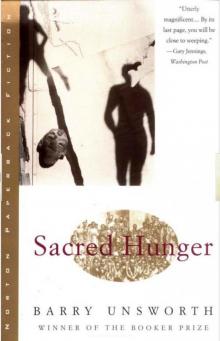 Sacred Hunger
Sacred Hunger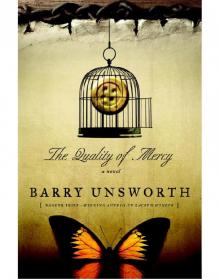 The Quality of Mercy: A Novel
The Quality of Mercy: A Novel The Songs of the Kings: A Novel
The Songs of the Kings: A Novel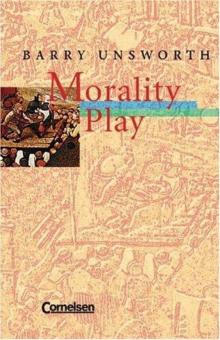 Morality Play. Mit Materialien. (Lernmaterialien)
Morality Play. Mit Materialien. (Lernmaterialien) Stone Virgin
Stone Virgin Land of Marvels
Land of Marvels Mooncranker's Gift
Mooncranker's Gift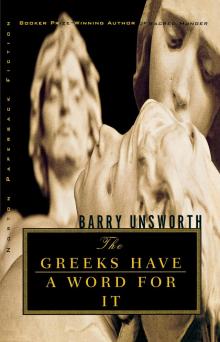 The Greeks Have a Word for It
The Greeks Have a Word for It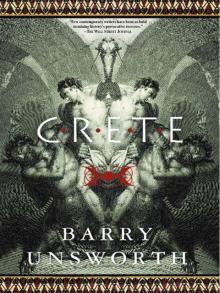 Crete
Crete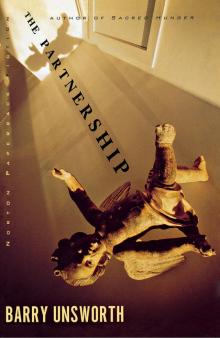 The Partnership
The Partnership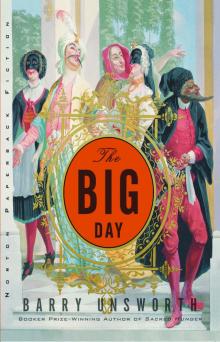 The Big Day
The Big Day The Hide
The Hide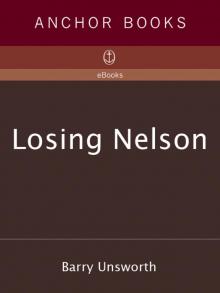 Losing Nelson
Losing Nelson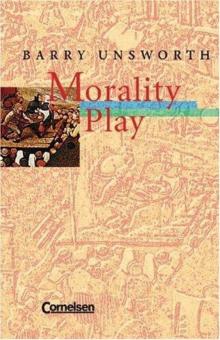 Morality Play
Morality Play Land of Marvels: A Novel
Land of Marvels: A Novel The Ruby In Her Navel
The Ruby In Her Navel